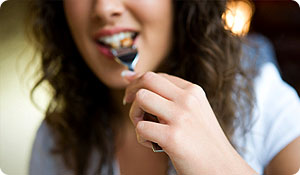
If you can't seem to keep the weight off, you may simply be following bad advice. The fact is, there are a lot of bogus diet claims out there-ones which could sabotage your good intentions. Here, the six most outrageous diet myths of all time.
1. Snacking will destroy your diet. This is true-if your snacks of choice consist of large quantities of potato chips, candy bars, or leftover takeout. The good news is that snacking can actually help you lose weight if the foods (and portions) that you select are healthy. Research has shown that eating five or six small meals, or snacks, a day is more effective for weight loss than eating two or three larger ones. This method of grazing works by keeping your metabolism in a constantly active state, which can increase the amount of calories you burn and, ultimately, the number of pounds you can drop.
2. Fat will make you fat. Like carbohydrates, fat has a bad reputation. Keep in mind, however, that not all fats are created equal. Saturated and trans fats can expand your waistline, raise your cholesterol, and increase your disease risk. But natural, unsaturated fats, found in foods such as olive oil, avocadoes, salmon, and nuts, are essential for good health and can help prevent certain diseases. When unsaturated fats are a part of daily meals, they can also help you feel fuller longer, decreasing the amount of calories that you consume.
3. As long as it's healthy, you can eat 'til your heart's content. A calorie is a calorie, despite the form that it takes. If you eat too much of anything, calories will add up and derail your weight-loss efforts. Watch out for foods labeled low-fat or low-calorie. A Cornell University study showed that people ate 28 to 45 percent more calories when eating low-fat foods because they thought it was acceptable to increase the amount they ate. Control your portions of all foods to keep the pounds off.
4. It's okay to forgo exercise. There have been an overwhelming number of conflicting studies about exercise, ranging from how often you need to do it to the intensity required for benefits. Some people even question whether it's actually a necessary component for weight loss. However, although diet alone may cause satisfactory weight loss, a regular exercise program (even if it's as simple as a daily walk after dinner) can accelerate your efforts by burning more calories, building muscle, and increasing metabolism. Additional benefits include increased energy, decreased appetite, and improved digestion, all things that can help with long-term weight loss.
5. Carbs are the enemy. With obesity and diabetes at an all-time high, carbohydrates have gotten a bad rap, mainly because dieters don't distinguish between the two types: simple and complex. Although neither is inherently bad, complex carbs (found in whole grains, berries, and beans) are starches that cause a more gradual change in blood sugar than simple carbohydrates. Complex carbs keep you full for longer periods of time, contain more nutrients and don't cause the crash associated with simple sugars, such as soda, candy, white bread, and processed snack foods.
6. Fasting will help you shed pounds faster. No one can deny the fact that if you stop eating, you'll lose weight. However, not only is crash dieting hazardous to your health; the results are only temporary-and you could actually impede your weight loss in the long run. Along with losing fat, fasting also removes lean muscle, and your body will start using fewer calories. As soon as you start eating again, your body will pile on these extra calories that it didn't need before your fast.





